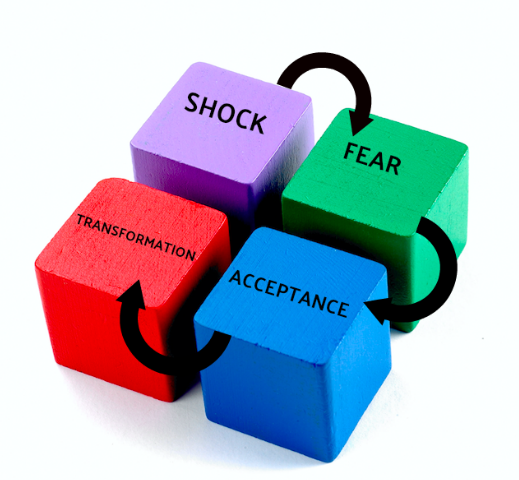
Change is inevitable when you are running a successful business—something is always evolving, whether it’s people, processes, policies, or products. But some leaders are much more successful than others in implementing change. They ones who do it right understand that you have to serve your people first before you serve the change.
What many leaders don’t realize is that people experience change in stages, and for change to be successful those stages need to be acknowledged and addressed with a team-centered strategy. Here’s an overview of each stage:
Shock. When any change is first introduced in an organization, the initial reaction is shock, accompanied for many people by denial and attempts to return to the status quo. Address this first stage with acknowledgment and communication. Let people know you understand and that you’re committed to communicating with them often and openly. Take the time to answer any questions that come up, and make sure they know where to go for more information if they need it. When people have information, they will understand what is happening and feel less threatened.
Fear. Once the reality sets in, many people react with negativity—a response that is grounded in fear. People’s first instinctive thought is, What will happen to me? It’s a normal reaction but one that can hinder acceptance of change. Some will wrongly fear negative consequences, and others will correctly identify real threats to their position. Manage fear by letting people express their feelings and concerns and giving them opportunities to vent their anger. Reactions are personal and sometimes emotional; listen and watch carefully so you can respond to the most apprehensive people on your team.
Acceptance. After fears have been expressed and understood, people begin to calm down and accept the situation. This is the turning point—the change intiative may be out of danger, but people will continue testing the boundaries and exploring what it means. Support people and establish a good foundation for this stage by making sure people are well trained and have early opportunities to experience what the changes will bring. Productivity may drop a bit at this point as people begin testing the waters.
Transformation. You’ve made it! People have expressed their fears and concerns, understood the reality, tested the boundaries, and now are ready for the transformation. This is the point where people stop focusing on what they’ve lost and begin considering how they can add value and reap the benefits. They become more productive and efficient, and the positive effects of change become apparent.
If you can recognize, acknowledge and address the four stages of change, your initiatives will have a great track record for success.
Lead from within: There is the right way to implement a change initiative and a wrong way—get it right by working through the four stages.
N A T I O N A L B E S T S E L L E R
The Leadership Gap: What Gets Between You and Your Greatness
After decades of coaching powerful executives around the world, Lolly Daskal has observed that leaders rise to their positions relying on a specific set of values and traits. But in time, every executive reaches a point when their performance suffers and failure persists. Very few understand why or how to prevent it.
Additional Reading you might enjoy:
- 12 Successful Leadership Principles That Never Grow Old
- A Leadership Manifesto: A Guide To Greatness
- How to Succeed as A New Leader
- 12 of The Most Common Lies Leaders Tell Themselves
- 4 Proven Reasons Why Intuitive Leaders Make Great Leaders
- The One Quality Every Leader Needs To Succeed
- The Deception Trap of Leadership
Photo Credit: iStockPhotos
Of Lolly’s many awards and accolades, Lolly was designated a Top-50 Leadership and Management Expert by Inc. magazine. Huffington Post honored Lolly with the title of The Most Inspiring Woman in the World. Her writing has appeared in HBR, Inc.com, Fast Company (Ask The Expert), Huffington Post, and Psychology Today, and others. Her newest book, The Leadership Gap: What Gets Between You and Your Greatness has become a national bestseller.
Trackbacks/Pingbacks
[…] The 4 important Stages of Change Management by Lolly Daskal […]
[…] The 4 important Stages of Change Management Written by: Lolly Daskal […]